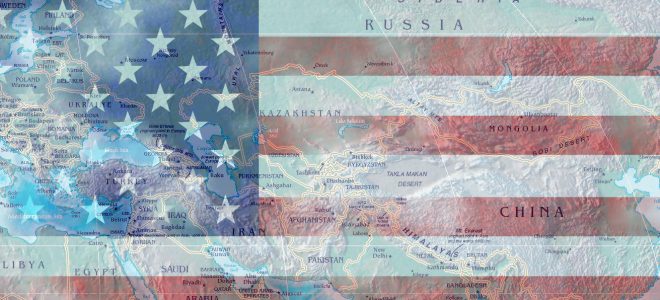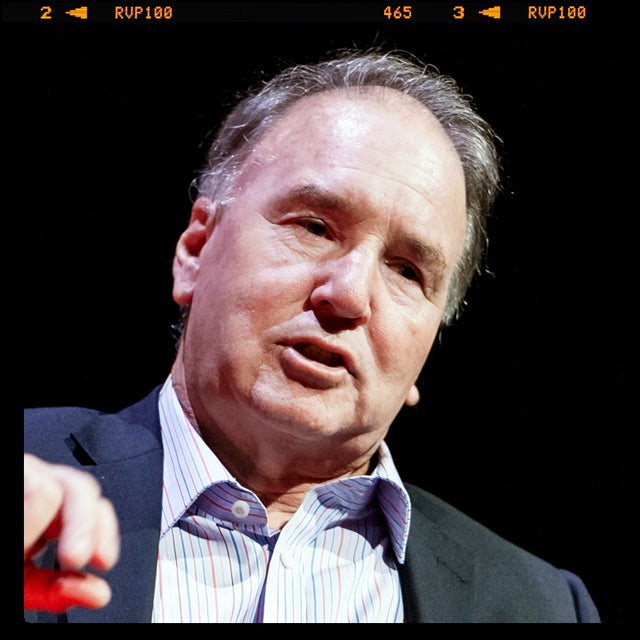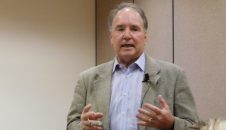

Ambassador Derek Shearer is Chevalier professor of diplomacy and director of the McKinnon Center for Global Affairs at Occidental College in Los Angeles. He recently spoke on emerging Trump foreign policy at Boise State University and before the Boise Committee on Foreign Relations.
During the 2016 campaign, presidential candidate Donald Trump spoke defiantly in favor of an “America First” foreign policy. He expressed disdain for the post-WWII consensus under which the United States emerged as the leader of countries supporting democratic governance and market economics. This globalist American foreign policy was built on military alliances– NATO in Europe, SEATO in Asia, security treaties with Japan and South Korea—and on economic ties– international trade and development regimes supported by the World Bank, the International Monetary Fund, the World Trade Organization, and regional trade agreements such as the North American Free Trade Agreement.
As Trump rejected this long-standing approach, he characterized over a half century of American foreign policy as stupid, ineffective, and not in the best interests of the American people. He vowed to change all of it. He questioned the value of NATO, suggesting that the US was being taken for a ride by European allies. He said that the US was needlessly defending Japan and South Korea when these countries could afford to defend themselves. He praised Russian leader Vladimir Putin, dismissing the Russian seizure of Crimea and stealth invasion of eastern Ukraine, and suggesting that he could single handedly improve US-Russia relations. He mocked US efforts in Syria, Iraq and Afghanistan, advocating the taking of Iraqi oil fields to pay for any military help.
Trump also blamed Mexico for sending criminals to the US, and NAFTA for destroying the jobs of American workers. He promised to build a wall on the US-Mexico border, make Mexico pay for it, and rip up NAFTA. He blamed China for taking American jobs, declared that he would label China a currency manipulator on day one in office, and impose a punitive tariff on Chinese goods. He offered unequivocal support for Israel and the government of Benjamin Netanyahu, questioned long standing US support for a two-state solution, and promised to move the US embassy from Tel Aviv to Jerusalem. He warned in apocalyptic terms about the threat of radical Islamic terrorism and vowed to ban most Muslims from entering the country. He stated his support for torture, saying it worked and that the bad guys deserved water boarding and worse.
Not only were Trump’s comments on US foreign policy unprecedented for any candidate of the Republican party, they were unsupported by the Republican foreign policy establishment. Almost every former Republican foreign policy and national security official publicly opposed his candidacy; many signed a statement saying he was unfit to hold the office. Unlike previous candidates of both parties, he had no team of expert advisers producing detailed policy papers. Instead, he relied on his own knowledge, a few former military officials with mixed reputations like former Army general Michael Flynn, and his own inner family circle, especially his son-in-law Jared Kushner.
As President, how much of this America First vision is Trump able to make happen?
Since his election and inauguration, the world has pushed back against Trump, and in some instances, he has had to adjust to reality. His transition call to Taiwan’s president and loose talk about ending America’s long standing One China policy quickly ended when Chinese leader Xi Jinping avoided speaking with him until he had expressed support for what has been US policy since Richard Nixon went to Beijing. He has not yet labeled China a currency manipulator. He had a meeting early on with Japanese prime minister Abe (including a golf outing and dinner at his Mar-a-Lago estate in Florida), and reaffirmed the US-Japan security treaty. North Korea’s testing of ballistic missiles appeared to play a role in his reversion to traditional US security policy in Asia. After a visit from the King of Jordan, who warned about uprisings if the US embassy were moved, Trump backed away from that commitment.
Revelations about Trump campaign officials’ contacts with Russia and the intelligence community’s unanimous conclusion that Russia had hacked the US elections seems to have tempered his praise of Putin. Former South Carolina governor Nikki Haley, his choice for ambassador to the UN, publicly criticized Russian activities in Syria and in Ukraine. Michael Flynn, his first choice for National Security Advisor, had to resign for not telling Vice President Pence the truth about meetings with Russian officials. Senator Jeff Sessions, Trump’s selection for Attorney General, appears to have misled Congress about meetings with the Russian ambassador during the campaign, fueling speculation about Russian influence on the election. After talking to general James Mattis, his choice for Secretary of Defense, and hearing Mattis’ opposition to torture, Trump said that he wouldn’t order it. He also tempered his anti-NATO comments and sent Mattis to the Munich Security conference to reassure European officials.
In other areas President Trump has tried to make good on campaign promises. He hastily issued a travel ban barring refugees and residents from seven majority-Muslim countries only one week after his inauguration. Federal courts halted the ban after a few days, however, necessitating a reworking and issuance of a second ban, which Federal judges in Hawaii and Maryland immediately put on hold, viewing it as continuing to target Muslims. He has played tough with Mexico, directing the government to enforce immigration laws more aggressively while developing policies that allow for significantly more expulsions, and reiterated his plan to revise if not abrogate NAFTA.
In the meantime, Trump has been slow to assemble a national security team. His initial appointments are heavy on former and serving military officials including John Kelly as head of Homeland Security, James Mattis as Secretary of Defense, and H.R. McMaster as national security adviser replacing Michael Flynn, who resigned after only 23 days on the job. President Trump also seems skeptical of civilian foreign policy experts and diplomats. Rex Tillerson, his Secretary of State, is a former oil company executive. Tillerson’s voice appears to be missing from discussions about the policy decisions being made in the White House. Conflict over personnel between the professionals and his White House political advisers is slowing the appointment of second level officials at the Pentagon and State Department. Professionals in the State Department are feeling maligned, mistrusted and sidelined. Trump’s initial budget proposal to the Congress calls for dramatic increases in military spending and equally drastic cuts for the State Department and foreign aid.
Trump’s ongoing criticism of US intelligence agencies including the CIA and the FBI doesn’t bode well for the future. He continues to question the veracity and competence of intelligence professionals, and blames them for leaks to the press. Whether former Congressman Mike Pompeo and former Senator Dan Coats, his political appointees to head the CIA and the National Intelligence Council, can quell these troubled waters remains unclear.
What can be said about the international impact of President Trump after only a few months?

There’s anecdotal evidence that American Soft Power—the way the country influences people around the globe through culture and civic values—has taken a severe hit. Trump’s America First campaign rhetoric did not play well abroad. His habit of daily Tweeting has had an adverse effect, as has the travel ban again Muslim countries. Many experts feel that the ban, catering more to domestic politics than actual national security needs, plays into the hands of ISIS and Al Qaeda, giving them a powerful recruiting tool. His cancellation of the Trans Pacific Trade partnership is regarded by columnists at the Wall Street Journal such as Andrew Browne as leaving the economic playing field to China. Trump’s heated attacks on the American press– labelling the New York Times, the Washington Post and CNN as the opposition and purveyors of fake news— resonates with authoritarian governments. Cambodia’s leader Hun Sun cited Trump’s comments in explaining his crack down on local media. The Chinese government has begun labelling as fake news reports that human rights lawyers are being beaten by police.
Trump’s anti-immigrant stance is proving a tonic to right wing nationalist parties and politicians across Europe. During the transition, he met with British nationalist leader Nigel Farage before meeting with British prime minister Theresa May. He openly praised the Brexit vote in the UK, and speaks disdainfully of the European Union. At home, the President is promising to deport two to three million undocumented workers, a plan some former agency directors think might not even be possible. Tales of family members arrested in front of their children’s or partner’s eyes are becoming staples of international reporting. Overflowing deportation centers run counter to American values embodied in the Statue of Liberty. An increase in extreme acts of intolerance – from anti-Semitic activities such as the vandalism suffered by Jewish cemeteries and synagogues to violent attacks such as the shooting of two Indian engineers in Kansas — are seen by some as the consequence of the political atmosphere created by the White House. Allies throughout the world now fear this atmosphere is eroding the nation’s moral authority. Many US colleges and universities are already reporting a ‘Trump Effect” with a noticeable drop in applications from international students.
What does the future hold?
The path ahead for the Trump presidency is lined with uncertainty and danger. A shooting war on the Korean peninsula is a risk of botched diplomacy and early morning Tweets. A terrorist attack on a Trump property abroad or an attack on American soil might provide justification for the President to intensify his attacks on the press, the intelligence agencies, and Democratic critics. Failure to develop an effective strategy on Russian aggression and hybrid ‘war’ could weaken the European Union and promote authoritarian governments in Eastern Europe. Unconditional support for the right-wing government in Israel and an abandoning of the two state policy could lead to renewed violence. Negating the Iran-US nuclear deal and stepping up hostilities with Iran could further destabilize the region, and spark a regional nuclear arms race. A trade war with China might ignite a global economic downturn.
The prudent course is for President Trump to listen to the advice of his professionals like generals McMaster and Mattis and rational Republican politicians like Coats, Haley, and Huntsman, to turn away from the Bannon and Miller chaos theory, and to adjust even more to reality. Whether he is capable of such a turn remains an open question. If he is not, how long will Republican majority keep him in the White House?